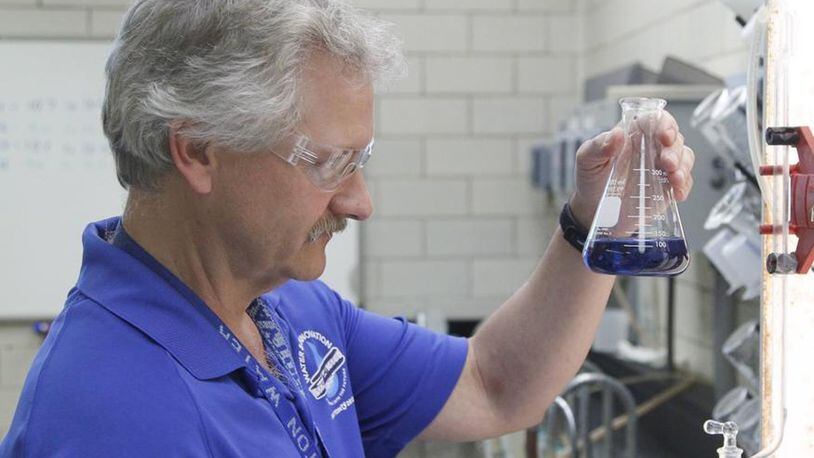The governor and 14 other governors also pressed the U.S. House and Senate to develop more comprehensive national legislation on PFAS chemicals and address PFAS contamination in and around military bases, including Wright-Patterson Air Force Base.
MORE: This chemical is in our water. Here are 15 things you should know if you drink Dayton water.
“It’s imperative that this issue not be left solely to the states to address,” DeWine said in Friday’s announcement. “While states are being responsive in evaluating PFAS risks, we are also in need of resources, guidance and a commitment from the federal government to effectively address contamination from these persistent substances.”
The Dayton Daily News Path Forward project digs into solutions for the most pressing issues facing the community, including protecting the region's drinking water that serves more than 400,000 people in Montgomery County.
DeWine’s order tasks the Ohio Environmental Protection Agency and Ohio Department of Health with developing a plan to test public and private water systems that are near known sources of PFAS to determine the size of the problem. They’re also ordered to continuously monitor emerging areas of national research related to adequate substitutes for the chemicals, soil remediation and technologies to treat PFAS.
A Dayton Daily News investigation in June found other states have already developed more stringent regulations around the chemicals, which a budding canon of scientific research suggests can lead to kidney and testicular cancer, thyroid disease, high cholesterol, ulcerative colitis, liver damage and pregnancy-induced hypertension.
The chemicals currently aren’t regulated in drinking water by Ohio or the federal government. The city’s test results for chemicals in Dayton’s treated drinking water have been below the federal suggested guidelines. But the Dayton Daily News investigation found the levels exceeded the limits or guidelines set by other states, including Michigan, Minnesota and New York.
“DeWine has the opportunity to join other states, like Michigan, in leading regulation of these emerging contaminants,” said Chris Tavenor, staff attorney for the Ohio Environmental Council, in a statement.
“Even as the Ohio EPA and the Ohio Department of Health conduct their study, the Ohio EPA should move forward with” drinking water regulations and water quality standards for PFAS, Tavenor said. “The General Assembly should ensure adequate funding exists to assess the entire state for PFAS contamination, protecting all communities.”
PFAS, or per-and polyfluoroalkyl substances, were once widely used in manufacturing, carpeting, upholstery, food packaging and other commercial and military uses. Notably, the substances were — and still are, in some places — used to extinguish fires that couldn’t be extinguished with water alone.
PFAS-based foams were formerly used at the Dayton Fire Training Center, 200 McFadden Ave., during testing exercises. The foams also have been used in exercises and actual fires at Wright-Patt. Both sites are located above the aquifer that supplies the region’s drinking water.
The military has already installed a filter to remove the chemical from Wright-Patt’s treated drinking water. U.S. Rep. Mike Turner, R-Dayton, said Congress has already prohibited the Department of Defense from using the chemicals in the future.
“I have strongly supported a number of provisions in this year’s defense bill to mitigate this chemical and keep our water safe,” Turner said.
But officials in Dayton are still working to figure out the best way forward in removing the chemicals. For now, they’ve shut down some wells. Dayton City Manager Shelley Dickstein said she was encouraged by DeWine’s announcement.
“Providing statewide leadership on this issue will help ensure that our citizens continue to have access to clean drinking water,” she said.
Dayton supplies a handful of cities in Montgomery County with drinking water through a contract with the county.
“Montgomery County welcomes Gov. DeWine’s leadership and these efforts to prioritize PFAS contamination testing and focus on remediation throughout the state,” said Michael Colbert, the county administrator.
“Water quality and the health and safety of our community is of the highest priority, which is why we are still moving forward with the help of the Ohio EPA to conduct PFAS contamination testing in our water distribution system,” Colbert said.
The city of Dayton and state of Ohio have separately sued PFAS manufacturers.
The state’s lawsuit alleges the foam “releases these toxic chemicals directly into the environment in a manner enabling them to seep freely into the groundwater — potentially contaminating drinking water supplies — and travel long distances to cause further, widespread environmental contamination.”
“A single firefighting event or training exercise may result in the release of thousands of gallons of foam solution,” Ohio’s complaint says. Dayton’s complaint says plumes of PFAS “can persist in underground aquifers for many decades. Once the plume reaches the well, it continues to contaminate the water drawn from that well.”
Read more Dayton Daily News water coverage:
» City: ‘We do not need’ more generators for water system, would cost $45M
» Dayton blames county contractor for February water outage
» Understanding Dayton’s drinking water issues
» Progress slow in addressing chemicals in local water systems
About the Path Forward
Our team of investigative reporters digs into what you identified as pressing issues facing our community. The Path Forward project seeks solutions to these problems by investigating the safety and sustainability of our drinking water. Follow our work at DaytonDailyNews.com/PathForward.
About the Author
